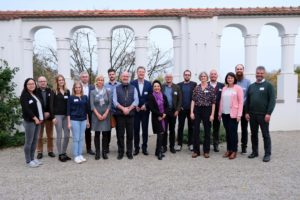The social transformation process associated with the energy transition was the focus of this year’s network meeting of the BayWISS Group College Life Sciences and Green Technologies, which took place in Illertissen on 4 November. At the invitation of Neu-Ulm University of Applied Sciences (HNU), around 40 participants from all over Bavaria discussed challenges surrounding the social acceptance of green technologies and exchanged ideas on fields of action and solutions.
A successful energy transition does not only require technological innovations, but is also dependent on these green technologies being accepted by the population. Research is already addressing the social rethinking in a variety of solution approaches – including the BayWISS Group College Life Sciences and Green Technologies, which addresses pressing global problems and promotes solution approaches to ensure sustainable development in accordance with the Sustainable Development Goals of the United Nations. The social acceptance of green technologies was the main topic of this year’s network meeting, which brought together the members of the Research Training Group at the University Centre Vöhlinschloss in Illertissen.
Rich programme of events around the topic of acceptance
Priv.-Doz. Dr. Elmar Buchner (HNU), who moderated the network meeting, and Prof. Dr. Elmar Steurer, Vice President for Research, Transfer and Internationalisation at HNU, accentuated the relevance of green technologies and the need to model social change in the opening of the event. How can the innovations and sustainable developments arising from research in areas such as energy and land use or digitalisation and technologisation also gain acceptance and support among the population? What challenges do researchers face today and how can they effectively inform the population and social actors about measures at an early stage and involve them in change processes? In his welcoming speech, Prof. Dr. Jörg Ewald, Hochschule Weihenstephan-Triesdorf (HSWT), explained the role of the Research Training Group, in which young researchers work on such and similar questions.
Researching together for a more sustainable future
Four doctoral students gave concrete insights into the diversity of this complex of topics: Patrizia Eben (HSWT) addressed multifunctional infiltration troughs, which can be made more attractive through optimised planting. Johannes Görl (also HSWT) looked at the role of plant carbon compost in reducing the toxicity of copper-polluted soils in his lecture. Jingyu Xie (Landshut University of Applied Sciences) presented her project on polydopamine in the development of modern battery cells to the plenum. The doctoral project of Robin Renoth (HNU) is dedicated to the acceptance of geothermal energy, which aims to objectify critical factors in the planning and implementation of geothermal projects and to develop solution approaches for the integration of different social groups. Astrid Heindel (Landshut University of Applied Sciences) also gave an impulse lecture on the topic of science communication and acceptance. Several other topics could be examined in the subsequent Science Café: With a total of eleven posters on display, the poster session offered plenty to discuss over coffee and cake.
Panel discussion: Acceptance of technical solutions in the environmental sector
The subsequent panel discussion dealt with the acceptance of technical solutions in the environmental sector. The panel, moderated by Prof. Dr. Cristina Lenz – Research Professor for Social Acceptance of Landuse at the HSWT – included Prof. Dr. Michael Drews, Assistant Professor for Geothermal Technologies at the TUM School of Engineering and Design at the Technical University of Munich (TUM), Dr. Dörte Ohlhorst, Doct. Dörte Ohlhorst, lecturer at the Chair of Environmental and Climate Policy at TUM, Sven Schmuderer, PhD student under Prof. Dr. Roland Zink at the Deggendorf Institute of Technology at TH Deggendorf, and Bernhard Gubo, Managing Director of Aufwind Engineering GmbH and Managing Partner of Geoenergie Bayern Beteiligungen GmbH. The five experts intensively discussed the basic pillars of acceptance, addressed current challenges in a constant dialogue between science and practice and outlined fields of action in which the acceptance of green technologies can be specifically promoted.
The culinary conclusion of the networking event offered participants the opportunity to pick up on impulses from the previous topics over a buffet, to make new contacts and to let ideas for joint research projects mature.

